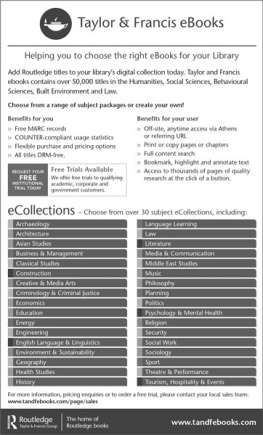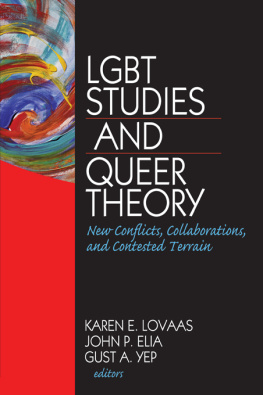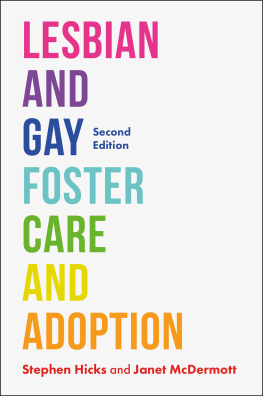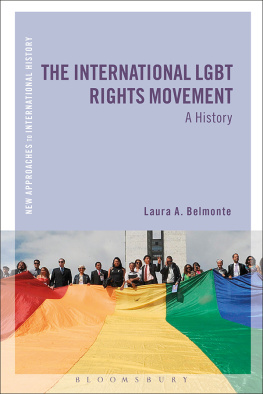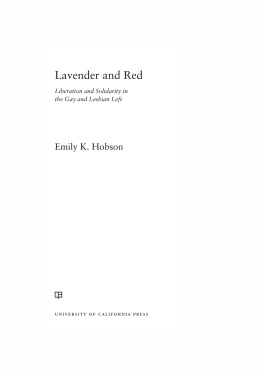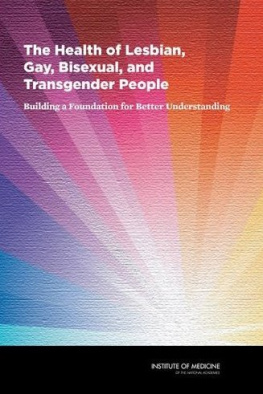A Recent History of Lesbian and Gay Psychology
This ground-breaking text explores the contemporary history of how psychological research, practice, and theory have engaged with gay and lesbian movements in the United States and beyond over the last 50 years. Peter Hegarty examines the main strands of research in lesbian and gay psychology that have emerged since the de-pathologizing of homosexuality in the 1970s that followed from the recognition of homophobia and societal prejudice.
The author details the expansion of lesbian and gay psychology to LGB to LGBT psychology via its paradigm shifts, legal activism, and shifts in policy makers and mental health professionals goals in regard to sexual and gender minorities. For the first time, the origins of the concepts, debates, and major research programs that have made up the field of LGBT psychology have been drawn together in a single historical narrative, making this a unique resource. A case is made that psychology has only very lately come to consider the needs and issues of transgender and intersex people and that LGB paradigms need to be critically interrogated to understand how they can be best brokered to bring about social change for such groups.
A Recent History of Lesbian and Gay Psychology will serve as an advanced historical introduction to this fields recent history and current concerns, and will inform both those who have been a part of this history and students who are new to the field.
Peter Hegarty teaches social psychology and the history of psychology at the University of Surrey where he also leads on research impact and public engagement for psychology. He has published extensively on the social psychology and history of sexuality and gender in psychology. This is his second book.
A Recent History of Lesbian and Gay Psychology
From Homophobia to LGBT
Peter Hegarty

First published 2018
by Routledge
2 Park Square, Milton Park, Abingdon, Oxon, OX14 4RN
and by Routledge
711 Third Avenue, New York, NY 10017
Routledge is an imprint of the Taylor & Francis Group, an informa business
2018 Peter Hegarty
The right of Peter Hegarty to be identified as author of this work has been asserted by him in accordance with sections 77 and 78 of the Copyright, Designs and Patents Act 1988.
All rights reserved. No part of this book may be reprinted or reproduced or utilised in any form or by any electronic, mechanical, or other means, now known or hereafter invented, including photocopying and recording, or in any information storage or retrieval system, without permission in writing from the publishers.
Trademark notice: Product or corporate names may be trademarks or registered trademarks, and are used only for identification and explanation without intent to infringe.
British Library Cataloguing-in-Publication Data
A catalogue record for this book is available from the British Library
Library of Congress Cataloging in Publication Data
A catalog record for this book has been requested
ISBN: 978-1-138-67939-9 (hbk)
ISBN: 978-1-138-67940-5 (pbk)
ISBN: 978-1-315-56344-2 (ebk)
The writing of this book has a longer past than its history. Its my attempt to capture something of teaching mostly undergraduate courses on this topic at Stanford (19971999), Yale (20012002), Michigan (2006), and Surrey (20082012), and at the University of Michigans International LGBT Psychology Summer Institutes, 2008 and 2010. As I moved around, so too did this field. At Stanford, this course was called Lesbian and Gay Perspectives on Psychology. By the time it was taught at Surrey it had become LGBT Psychology. I always aimed these courses to raise questions beyond the specifics of LGBT peoples lives and experience, and to reach for broader relevance for psychology. Indeed in 2013 and 2014 Surrey students encountered many of the ideas here in a course titled General Psychology. This book similarly insists that LGBT psychology is of general relevance to psychologists and their historians.
In the past 20 years, I have learned a lot from listening to what sense students make of ideas, writings, and findings in this field. I always allowed students to write their research papers about any topic, and their choices taught me how history moves fast. Even at Stanford between 1997 and 1999 students wrote far fewer essays focused on HIV/AIDS and more essays about transgender. Progressive change has not always been guaranteed. In 2006, many Michigan students took up the task of refuting psychiatrist Robert Spitzers study on conversion therapies, an essay topic that would have seemed uninteresting and even backward to students in the late 1990s. At Surrey, I felt no need to teach about biological models of sexuality at all, as they were neither of particular interest to the UK students, nor relevant to their socio-political context. Nonetheless, students have always chosen to write about prejudice, always about lesbian mothers, and always about under-researched intersecting identities. I have taken the same freedom here to write about what I know and what interests me most in this history. Consequently, this book also draws together ideas that I have expressed as a social psychologist, critical psychologist, and historian of psychology. This emphasis is clearest in Chapters 5 and 6 where I place some research that I did myself in the larger context of the field.
I mean this book to be of use to students who are similarly interested in developing their own perspective on LGBT psychology. Those who aim to do so can be bothered by naysayers inside and outside the head who insist that this area is marginal, trivial, unscientific, or biased by political correctness. Many students are not given a chance to consider this area of psychology as a specialty at all. Others continue to be told as I was that specializing in this area might be well-intentioned, but that ultimately and inevitably it is ill-informed and career-limiting. (Especially now!) Moreover, when working in LGBT psychology projects, I have been most demanded to think critically, holistically, reflexively, and practically, and these tensions demand the best psychology from psychologists. Specializing in this area has not limited my career, quite the opposite.
In writing that last sentence, I am haunted by the knowledge that acknowledging that LGBT psychologists can succeed immediately invokes in some people the response that then, surely, the fields major fights are in the past, and so that the field is pointless (and that those that would think otherwise are asking for special favors). One of my motivations to write about this field historically is to get past the schema in which the fields past achievements seem inevitable, trivial, or to-be-assumed, whilst those in the future seem so unlikely or unimportant that it would be unwise to pursue them. Indeed, I take the many ways in which people come out as just about anything, use the suffix -phobia to call attention to an under-recognized prejudice, and seek to add letters beyond the LGBT taxonomy in psychology all to recognize that lesbian and gay psychology achieved something of generalizable usefulness, whose importance went beyond the lesbians and gay men to whom it initially applied.
I also hope this book will interest scholars looking for a single source on the recent history of lesbian and gay-affirmative psychology. This book covers events during the period roughly from the early 1970s to the end of the 2000s. Psychological research not psychotherapy, psychiatry, health psychology, or lesbian, gay, or queer studies is at its center. I originally planned to take the book all the way up to the present, but in writing it over 20152016 the present changed again with such rapidity that it first seemed difficult, and only later

